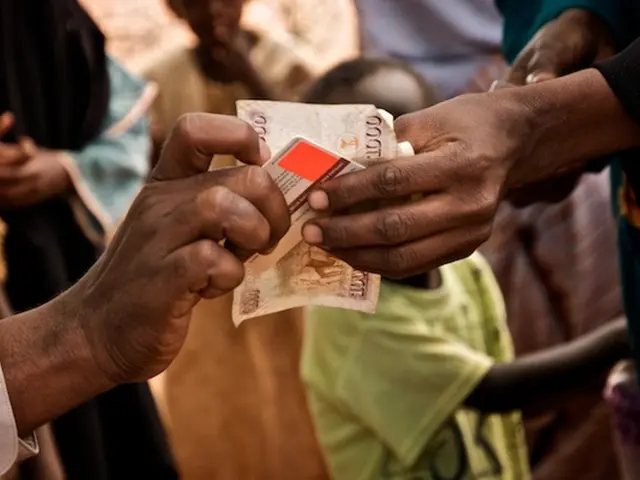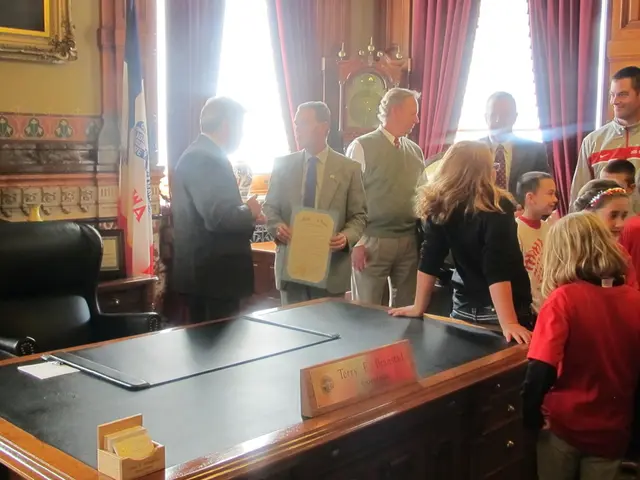Illegal gambling activities thrive at Lake Pine Resort in Thailand
Thai Police Arrest 18 Suspects Operating Illegal Gambling Websites, Seize Millions in Assets
In a significant crackdown on illegal gambling activities, the Thai Police, in collaboration with the Cyber Taskforce, have arrested 18 individuals running two illegal gambling websites at Lake Pine Resort in the Pak Chong district of Nakhon Ratchasima province.
The suspects, who were reportedly operating in Cambodia for four years before moving to Thailand last year, were using all 10 rooms at Lake Pine for the operation of the two gambling websites. The police confiscated 30 mobile phones, 10 desktop computers, and five notebooks during the raid, along with 12 bank account registers.
The illegal gambling websites were reportedly generating more than THB200 million (US$5.84 million) and receiving at least THB20 million (US$584,600) per month in bets. The operation of these websites was prompted by complaints about a YouTuber named "Jah Rok" who encouraged people to place online bets.
While the Thai government has been considering the legalization of casinos as part of a broader plan to develop integrated entertainment complexes, political turmoil and public opposition have stalled the initiative. Kovit Puangngam, a Member of Parliament from the Thai Local Power Party, agrees with the push for gambling reform, suggesting that legalizing online casinos would allow authorities to collect taxes and punish illegal operators.
The legalization effort, which had been progressing under Prime Minister Paetongtarn Shinawatra's administration, faced strong opposition from religious groups, civic organizations, and segments of the public concerned about gambling-related social harms and crime. Following Paetongtarn’s suspension as Prime Minister in June 2025, political instability intensified opposition. As of August 2025, the government confirmed plans to withdraw the casino legalization bill entirely amid mounting public and political pressure.
Despite the setback, Thailand could potentially make THB1.5 trillion (US$43.8 billion) from online casino tax collection and application fees if the government decides to legalize gambling activities in the future. Las Vegas Sands, a major player in the global casino industry, is reportedly already talking to Thailand about the possibility of joining if the country moves forward with gambling reform.
Thailand is one of three ASEAN members that has yet to legalize casinos. If the government decides to legalize casinos, the first ones could potentially be located in Bangkok or nearby areas. A member of the committee exploring the legalization of casinos expects to release findings next month.
Meanwhile, the leader of the Kla Party, Korn Chatikavanij, has stated that he hopes Thailand will pursue gambling reforms. He believes that legalizing casinos could attract foreign investment, boost tourism, create jobs, and bring underground gambling into the formal economy, potentially generating between 12 and 40 billion baht (~US$336 million to 1.12 billion) annually in tax revenue from gambling activities alone.
References:
- Bangkok Post
- Reuters
- The Nation
- Khaosod English
The arrested suspects were operating illegal casino-games websites, serving as a stark reminder of the widespread casino-and-gambling activities in Thailand. Despite the current ban on casinos, there is ongoing general-news discussion about the potential legalization of casinos for tax revenue and economic development. Korn Chatikavanij, the leader of the Kla Party, expressed hope for gambling reform, citing potential benefits such as attracting foreign investment, boosting tourism, and reducing crime associated with underground gambling.





